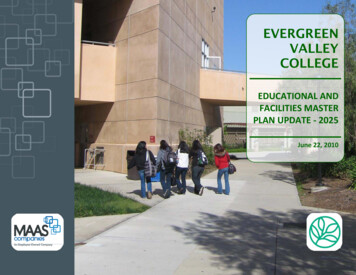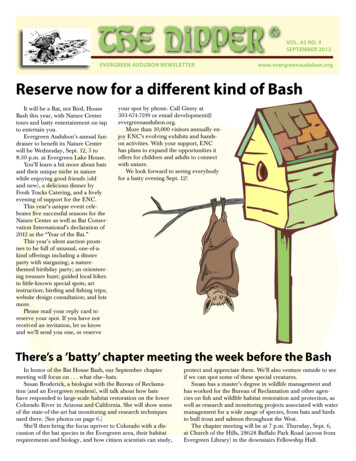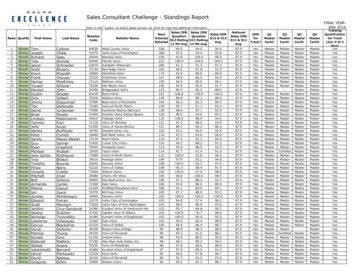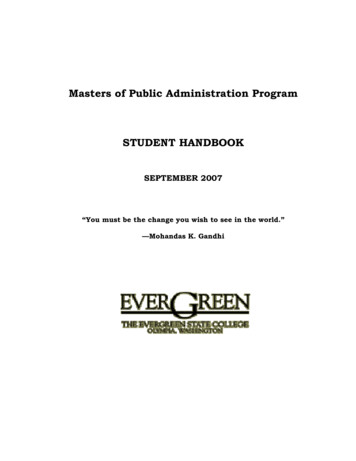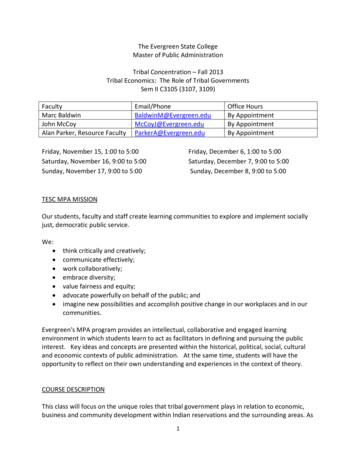
Transcription
The Evergreen State CollegeMaster of Public AdministrationTribal Concentration – Fall 2013Tribal Economics: The Role of Tribal GovernmentsSem II C3105 (3107, 3109)FacultyMarc BaldwinJohn McCoyAlan Parker, Resource rgreen.eduParkerA@Evergreen.eduFriday, November 15, 1:00 to 5:00Saturday, November 16, 9:00 to 5:00Sunday, November 17, 9:00 to 5:00Office HoursBy AppointmentBy AppointmentBy AppointmentFriday, December 6, 1:00 to 5:00Saturday, December 7, 9:00 to 5:00Sunday, December 8, 9:00 to 5:00TESC MPA MISSIONOur students, faculty and staff create learning communities to explore and implement sociallyjust, democratic public service.We: think critically and creatively;communicate effectively;work collaboratively;embrace diversity;value fairness and equity;advocate powerfully on behalf of the public; andimagine new possibilities and accomplish positive change in our workplaces and in ourcommunities.Evergreen's MPA program provides an intellectual, collaborative and engaged learningenvironment in which students learn to act as facilitators in defining and pursuing the publicinterest. Key ideas and concepts are presented within the historical, political, social, culturaland economic contexts of public administration. At the same time, students will have theopportunity to reflect on their own understanding and experiences in the context of theory.COURSE DESCRIPTIONThis class will focus on the unique roles that tribal government plays in relation to economic,business and community development within Indian reservations and the surrounding areas. As1
the local government within reservation boundaries, tribes are responsible for determiningwhich business enterprises may be licensed, which economic activities are to be permitted byindividuals and corporations and which are to be tribally-managed. Tribal governments areresponsible for regulating all land uses and to assess the environmental impacts ofdevelopment proposals. In fulfilling these responsibilities, tribal governments constitute theprimary authority charged with safeguarding the public good and protecting the tribalcommunity from any harmful practices of private business. At the same time tribes strive tocreate an environment in which legitimate business and commerce may flourish. Tribalgovernments have the authority to impose taxes on economic activities and businesstransactions in order to generate revenue for public services. They must also fund thedevelopment of physical infrastructure such as roads, utilities, etc. Tribes take on the role of“community development” which includes construction and maintenance of public housing,schools, health care facilities, public recreation and cultural preservation. In this course, we willexamine how tribal governments balance these complex and challenging roles in the context ofcultural compatibility with the values and traditions of the tribal community and integration ofthe Tribes role within the surrounding non-tribal communities and external public landmanagement agencies.BOOKS (required)Katz and Bradley, The Metropolitan Revolution, Brookings Institution Press, June 2013.ISBN 978-0-8157-2151-2Jorgensen, ed., Rebuilding Native Nations: Strategies for Governance and Development,University of Arizona Press, ISBN 978-0-8165-2423-5Miller, Reservation Capitalism: Economic Development in Indian Country, Bison Books,2013, ISBN 978-0-8032-4631-7Harvard Project on American Indian Economic Development, The State of the NativeNations: Conditions Under US Policies of Self-Determination available as a pdf file here:(link will be on moodle)Readings associated with specific lectures and topics will be included on the moodle site for thisclass.COURSE STRUCTURE/ LEARNING OBJECTIVESThis course will build an understanding of the unique role of tribal governments in promotingeconomic development. Our goal is to combine rigorous academic training with “real world”applications. Our learning objectives include three levels of increased understanding:2
Create a framework for thinking about economic change and economic development ingeneral (“Intellectual Tools”)Develop tools for evaluating economic development proposals (“Building Blocks”)Create strategies for addressing unique issues of economic development in tribalsettings (“Examples”)MPA graduates are reflective practitioners who apply their academic training in concretesettings. This course is designed to provide students with the tools and examples to make thatpossible.ASSIGNMENTSStudents are expected to be prepared and to participate in class discussions, particularly inseminar settings. In addition to this general expectation, three papers and a presentation arerequired.Longer papers (up to 20 pages, single spaced).1. Students should reflection on economic development strategies and job creation intribal settings. This work will be based on insights gained from the first weekend ofclass and associated readings. Issues might include the use of specific economicdevelopment tools, the appropriateness of academic insights to tribal applications,and the implications of tribal context when applying economic developmentstrategies or academic tools. This might be an expansion of the topic from yourseminar paper with additional sources. Due Wednesday November 27th at 5:00 onthe moodle site.2. Final paper on specific case. This paper will demonstrate your understanding of aspecific tribal economic development issue and application. You may want to writeabout a specific economic effort by a tribe. You might want to compare similarefforts across various tribes in different geographies. This paper is about “on theground” efforts. Due December 12 at 5:00 on moodle.PresentationsThe final paper described above is the topic for student presentations. Thesepresentations will be a maximum of 15 minutes. They should introduce the audience tothe topic you have chosen, describe the key events and issues, and conclude with yourinsights for future work. You are reflecting on the experience you describe andtranslating those insights into advice for your colleagues in the class. Your presentationcan take advantage of whatever technology or presentation method you choose, butyour goal is to improve the effectiveness of your colleagues through education. Wehave a large class and time limits will be rigorously applied.3
Seminar Paper (up to 5 pages, single spaced).1. Reflective paper that explores the connections, tensions, and disagreementsbetween the Katz and Bradley reading and the Jorgensen (ed.) selections. DueNovember 21st at 5:00 on moodle.4
5
SCHEDULE: Friday November 15 to Sunday November 17DAYFriday 11/151:00WORKINTELLECTUAL TOOLSREADINGSWelcome, Course Plan (MB/JM)Will provide links to lecturearticles.Introduction to economics (MB)GIS Techniques and Planning (JM)Saturday11/169:00 to 12:00INTELLECTUAL TOOLS (Context)Selections from JorgensenTribal Governance (JM)USC 25Public Law 280Harvard Project (link)Guest: legal scholar?11:00 to 12:00Seminar on Jorgensen, ed. (MB/JM)Saturday11/161:00 to 5:00Sunday11/179:00 to 12:00BUILDING BLOCKS: Theory into PracticeEnvironmental Impact Statements (MB)Comprehensive Planning (JM)Katz and Bradley (2013)3:00 to 5:00Seminar on Katz and Bradley book (MB/JM)EXAMPLESTribal economic development examples andspeakersTaxation and Tribal Economic DevelopmentStrategy (Alan Parker)Sunday11/171:00 to 5:00Quil Ceda Village CaseSpilde, “Essential triballeadership throughpartnerships, governance andsovereignty,” 2013 (moodle)6
Between ClassesSeminar Paper on first weekend readings.Due Thursday, November 21at 5:00 on moodle.SCHEDULE: December 6 to 8DAYFriday (MB)12/61:00 to 5:00WORKBUILDING BLOCKS: Theory into PracticeREADINGSEconomic Modeling Tools (MB) Input-Output Tables General Equilibrium Modelso REMI exampleWorkshop on Economic ModelingSaturday12/79:00 to 12:00EXAMPLESSaturday12/71:00 to 5:00CONTEXTGamblingFishingTourismInnovation StrategiesMiller (2013)Coalitions (MB/JM) Native Corporations (MB) 5 Tribes in Saskatchewan (JM)3:30 to 5:00Seminar on Miller (MB/JM)Sunday12/89:00 to 12:00Lunch1:00 to 5:00REVIEW AND REFLECTIONPresentations of Student CasesFINAL PAPERS DUE DECEMBER 12 at 5:00 ON MOODLE SITE.7
The Evergreen State College Master of Public Administration Tribal Concentration - Fall 2013 Tribal Economics: The Role of Tribal Governments Sem II C3105 (3107, 3109) Faculty Email/Phone Office Hours Marc Baldwin BaldwinM@Evergreen.edu By Appointment John McCoy McCoyJ@Evergreen.edu By Appointment Alan Parker, Resource Faculty ParkerA@Evergreen.edu By Appointment Friday, November 15, 1:00 to .



